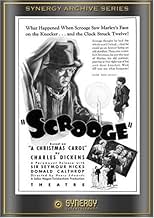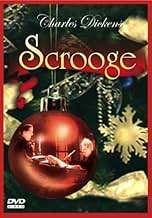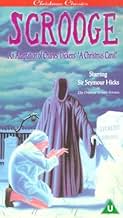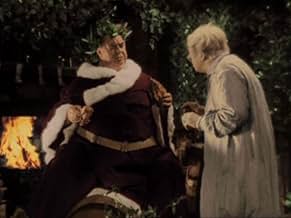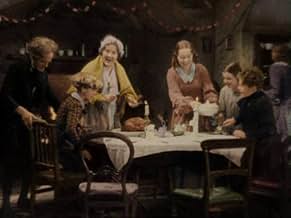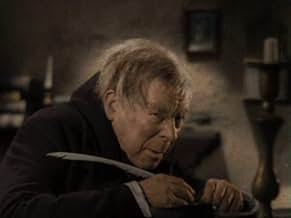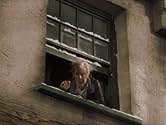Füge eine Handlung in deiner Sprache hinzuEbenezer Scrooge, a mean old miser, hasn't a good word for Christmas, though his impoverished clerk Bob Cratchit and nephew Fred are full of holiday spirit. On Christmas Eve, Scrooge is visi... Alles lesenEbenezer Scrooge, a mean old miser, hasn't a good word for Christmas, though his impoverished clerk Bob Cratchit and nephew Fred are full of holiday spirit. On Christmas Eve, Scrooge is visited by spirits of the past, present, and future.Ebenezer Scrooge, a mean old miser, hasn't a good word for Christmas, though his impoverished clerk Bob Cratchit and nephew Fred are full of holiday spirit. On Christmas Eve, Scrooge is visited by spirits of the past, present, and future.
- Regie
- Drehbuch
- Hauptbesetzung
- Auszeichnungen
- 1 Gewinn & 1 Nominierung insgesamt
- Ebenezer Scrooge
- (as Sir Seymour Hicks)
- Fred's Wife
- (as Eve Grey)
Empfohlene Bewertungen
This adaptation takes a few wrong turns. It takes far too long before we get to the actual haunting, with the first 30 minutes being positively meandering. There's also a perfunctory sequence, featuring none of the main characters, where the King is celebrated. Maybe this kind of thing pleased the masses back in the thirties, but it does make the opening act a bit of a slog.
One would hope that things would get back on track when Jacob Marley appears. Unfortunately, Jacob Marley doesn't appear at all; he's a rather unimpressive voice-over. It's an odd choice; as if the makers aren't confident enough to give us a character design that will work for us.
Unfortunately, the sequence following this isn't much better. The visit from The Ghost of Christmas Past is done and dusted in less than 5 minutes (I'm not exaggerating). There's nothing of Scrooge of a boy, no mention of Fezziwig and we only really see the break-up of his relationship with Belle (and nothing of the good times Scrooge shared with her). This is a major misstep; as it fails to adequately give us Scrooge's backstory. Considering what *is* included in this adaptation, it's baffling that such a key segment was skipped over. I'm wondering if it was abridged so that they'd be no need for other, younger actors to play Scrooge, but that seems like an unnecessary compromise.
The Present and Yet To Come sequences fare better, and the conclusion to the story is really rather good as adaptations of the novella go. However, the damage has already been done.
It's a big shame as the cast are fine. Seymour Hicks may be a touch too shabby for my tastes as Old Scrooge, but he's able to give us a decent contrast in his performance (even if his redemption is far too quick, and seems almost complete after a quick glimpse at his past).
In summary, this is probably on an even footing with the Reginald Owen offering from just three years later (1938). Both have as many flaws as aspects to recommend, but both are worth a watch to aficionados of the classic story.
The Sim Scrooge is utterly plausible much of the time, but then he will be as giddy as a schoolboy, for example, giving an interpretation that an incorrigible naysayer could choose to quibble about. My reaction to Seymour Hicks was similar but, strangely, in alternation with Sim -- oh, he's better than Sim here, worse than Sim here, more realistic here, less realistic here. Any given scene with Hicks could be better, worse, or just plain different from the corresponding scene with Sim. This is partly what made seeing this version so enjoyable; you really couldn't second-guess the next scene.
There are significant differences in the portrayal of the ghosts. I think we are all familiar with Michael Hordern's eerie and frightening ghost of Jacob Marley, shrouded in chains, from 1951. In this version, Marley's ghost is invisible!! You hear the chains but you see nothing whatsoever. The Ghosts of Christmas Past and Future are also quite non-corporeal. Only the Ghost of Christmas Present is someone we recognize from Sim.
Tiny Tim is quite different. We expect Tiny Tim to be an eternal optimist, irrepressibly cheerful. But the Sim Tim (boy, I loved typing that) seems to overdo it a little. He appears to be "on something", to use the vernacular. In this version, Tim is toned down. In some ways, it's an improvement. In the Sim version, to its credit, there is a special balance however, namely, the repentant Scrooge has an exuberance which matches Tim's precisely, and they appear together in the final shot, as we all know. A perfect ending. Back to that later. A key difference in Hicks: at the tragic moment, we do not see the lonely crutch we're used to; oh no, we see Tiny Tim lying dead!!
This version has some scenes which are not in Sim. This version in general has more singing, and one of the extra scenes involves the Lord Mayor of London giving his Christmas toast to Victoria followed by the singing of God Save The Queen.
In Sim, Scrooge comes to his senses on Christmas Day and there is a warm and funny scene with Mrs. Dilber, the housekeeper. Not here. Here there is an extended scene of Scrooge and the prize turkey! Scrooge goes to the butcher shop which is closed, snow falls on Scrooge, Scrooge throws snow, snow hits butcher. Butcher opens up, Scrooge orders turkey, Scrooge goes home. Scrooge gets dressed, boy brings butcher, Scrooge still dressing, butcher tries to leave with huge turkey, Scrooge answers door. Scrooge then pays the butcher, pays the boy, and gives the boy extra money so the boy can take the turkey to Bob Cratchit's house in a cab! Scrooge then leaves the house whereupon he meets the two gentlemen who were soliciting for the poor earlier in the film and volunteers to give them 100 pounds!
So, how does the film end? There's nothing about rushing right out to buy a new coal scuttle. No mention of scuttles in this film. It's Boxing Day and Scrooge gives Bob the day off. Then Scrooge joins Cratchit in church (!) for the singing of Hark the Herald Angels Sing. The End, with Tiny Tim not to be seen anywhere. So perhaps it's the warm emphasis on Tim that really clinches the 1951 version.
There are many moments of surprise and enjoyment here if the opportunity should ever present itself.
The performances of the rest of the cast are on the same level, with Oscar Asche's Falstaffian Ghost of Christmas Present a particular standout. And, although this is probably the one major film version of the story where you don't actually see Marley's Ghost, the anonymous actor who provides his voice, the accompanying special effects, and Hicks's reactions are enough to make the scene that much spookier.
Finally, kudos to Sydney Blythe and William Luff for their excellent camerawork. Fog-shrouded 19th century London has rarely been presented this well in ANY picture. And the play of light and shadow, particularly during the Christmas-Yet-to-Come sequence, would scare even the Scroogiest among us into repentance.
In sum, while this is not on the level with the excellent versions I've already mentioned, it has more than its' share of good points, and deserves to be seen at least once.
Wusstest du schon
- WissenswertesSeymour Hicks first played Scrooge onstage in 1901 and it became his most popular role. Throughout his career he played it over a thousand times, often at fund-raising benefits.
- PatzerAs Cratchit enters a room to see his dead son Tiny Tim, a crew member's middle finger can be seen slowly closing the door behind him.
- Zitate
Lord Mayor's Secretary: [at a huge Christmas Eve dinner being held for polite society] My Lord, shall we proceed with your speech, or shall we let the ladies and gentlemen continue to enjoy themselves?
- Crazy CreditsOpening credits at the commencement of the story in the book: "I have endeavoured in this Ghostly little book to raise the Ghost of an Idea which shall not put my readers out of humour with themselves, and each other, with the season, or with me. May it haunt their houses pleasantly, and no one wish to lay it."
Their faithful Friend and Servant, CHARLES DICKENS December, 1843
- Alternative VersionenA colorized version was produced and released in 2007.
- VerbindungenFeatured in A Hollywood Christmas (1996)
- SoundtracksHark! the Herald Angels Sing
(uncredited)
Written by Charles Wesley and Felix Mendelssohn
Heard behind the opening credits, sung later by Philip Frost and sung in the church at the end
Top-Auswahl
Details
- Erscheinungsdatum
- Herkunftsland
- Sprache
- Auch bekannt als
- Eine Weihnachtsgeschichte
- Drehorte
- Twickenham Film Studios, St Margarets, Twickenham, Middlesex, England, Vereinigtes Königreich(studio: produced at Twickenham Film Studios)
- Produktionsfirma
- Weitere beteiligte Unternehmen bei IMDbPro anzeigen
- Laufzeit1 Stunde 18 Minuten
- Farbe
- Seitenverhältnis
- 1.37 : 1
Zu dieser Seite beitragen


